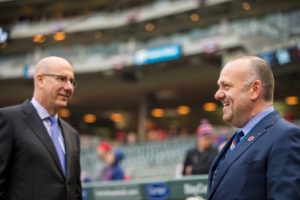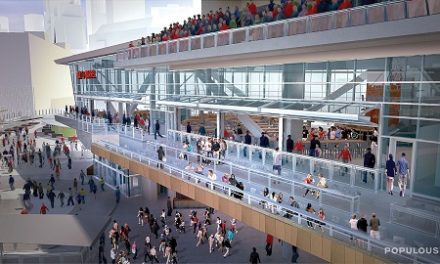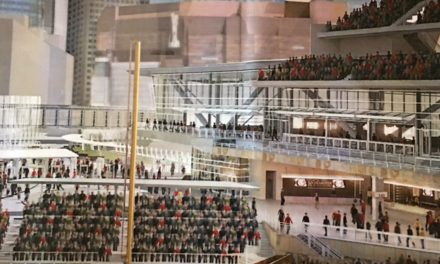As the Twins sprint toward a possible post-season berth on the field, front office staff is ramping up its planning for what those extra games at Target Field might look like.
Twins staff have contacted full season-ticket package about their interest in attending potential games wild card tiebreaker or postseason games and they are in the process of reaching out to those with partial packages.
Matt Hoy, senior vice president of operations for the team, says superstition demands that staff hold off as long as possible before diving in head first, but with just 16 games remaining and the team three games up in the race for the second wild card spot, full-scale planning has begun in earnest.
“We don’t want to assume we are going to get there and take too many actions that might take the form of arrogance on our part,” he says.

Matt Hoy, left, and Dave St. Peter enjoy a light moment at Target Field
“Over the years I’ve always been cautious about doing too much too soon and taxing our staff who are very hard-working group of people.”
The ticketing piece has been underway for a while.
“We do what we need to do initially,” he says. “That primarily relates to tickets.”
Hoy and Dave St. Peter, Twins president, both say electronic ticketing has made that much easier. St. Peter notes that fans can commit to buy tickets, but if those games never take place, they don’t pay. That’s one of many differences from playoff runs in 1987, 1991 and even into the 21st Century, where fans had to pay for an entire strip of tickets in advance.
“We do what we need to do initially,” Hoy says. “That primarily relates to tickets.”
Getting serious
On other issues, such as security, hospitality, operations, sponsorships and other post-season issues, the team had its first meeting the first week of September.
Hoy snuck in a week’s vacation, returning earlier this week. And the next meeting will happen Monday. The team would go on the road as the second wild card team. And a win in that game would send the team on the road until game three of a potential divisional series. So much of that meeting will revolve around the possibility of hosting one or more tiebreaker games between the end of the regular season and the wild card game.
In the interim, staff has been working on various issues the team must communicate to the league, such as hospitality events the Twins might host for the team, the league or their various sponsors, in or near the ballpark
Baseball also wants to know about the team’s video systems in case teams want to add more video product.
“You’re required to provide all the specifics of those video assets throughout the ballpark,” he says.
The league takes on an increasing amount of the sponsorship arrangements as the postseason progresses, St. Peter says, though adding that the league will not force a team to hide its own sponsors when there is a conflict. For example, Major League Baseball partners with Coca-Cola, but the Twins partner with Pepsi Co. The Twins don’t have to take down their Pepsi taps, he says.
Then there is dealing with the media. During 1987 and 1991 World Series runs, a couple of production trucks and a couple of uplink trucks all parked in the Metrodome parking lot.
“Now it’s a compound of vehicles,” Hoy says.
And staffing for the event. The team used to have to call everybody. Now, with email and cell phones, Hoy says even the uncertainty of when games might be played, staff can contact its users, grounds crew, guest services officials, security guards and whoever else might need to report for duty on short notice.
As plans develop, Hoy will reach out to the Minneapolis Public Works Department to talk about issues like traffic control, parking and street closures, and to make sure both sides are on the same page about potential conflicts related to events or games at Target Center or U.S. Bank Stadium.
Hoy and St. Peter says all postseason plans, even down to National Anthem singers and first-pitch throwers, must be discussed with the league. They add that early on, the league takes a less direct role. The further teams advance, the more the league is involved.
“Baseball, as you get into the playoffs, they pretty much leave you alone. Game 163 or 164, we’re pretty much on our own,” Hoy says. “Division series, they’re a little more in your kitchen. ALCS, obviously they become more involved. When you get to the World Series, it’s Major League Baseball’s event.
“We’re used to working with them and have great relationships there. I’m confident that no matter how far we progress we’ll have no problem putting everything together.”
No complaints
It takes a lot of planning and work to prepare for the postseason and team officials are well aware it could be all for naught. With the wild card round and potential tiebreaker games, it’s possible that even if the Twins make the postseason, Target Field never hosts a game.
“There is a cost of time and energy,” St. Peter says. “You try to mitigate said costs. … There is a little bit of caution as you go into it. But you have a responsibility to the industry, you have responsibility to our ownership to plan for all kinds of different contingencies. That process is well underway.”
“Organizationally you accept that,” he adds. “That’s the cost of having success. And I assure you the advantages, including the revenues, of having on-field success far outweigh the challenges.”
Putting together the details is challenging. But while the team is young on the field, it has a veteran front office staff that has been through playoff runs and high-profile events before. Hoy himself has led such planning several times. The team, he says, will draw on the experience of hosting the 2014 All Star Game at Target Field.
“They’ve gone through it,” Hoy says. “They understand the magnitude of the event.”
And nobody from the Twins staff is complaining, St. Peter adds. Every team, he says, would like to be in the position to be planning for such games and it’s far better than the alternative.
“If anything,” St. Peter says, “it might make it more special.”





Recent Comments